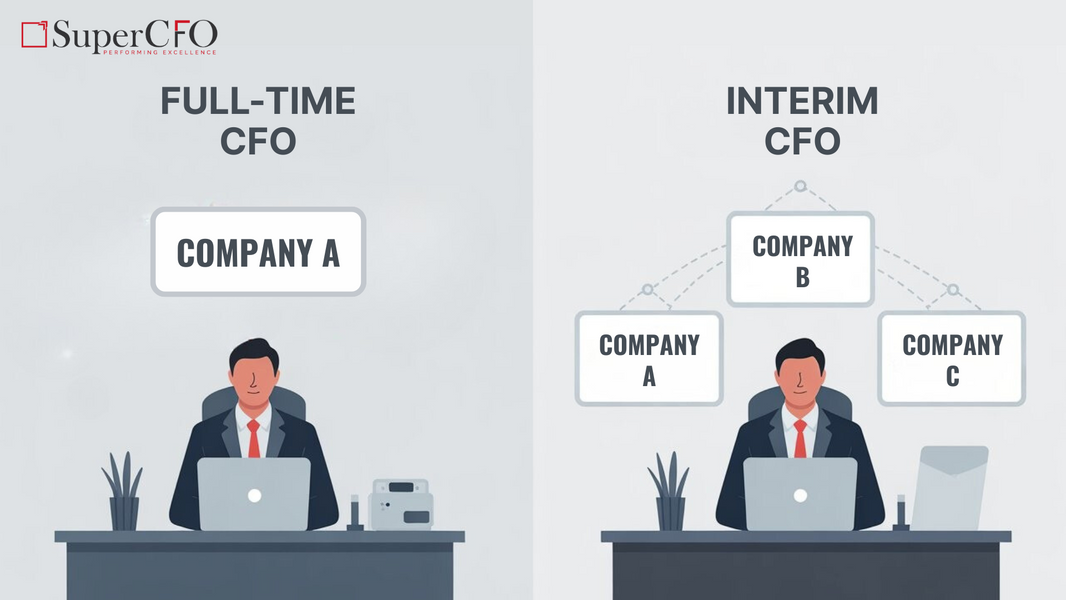Financial Controller vs FP&A Head: Which Finance Leader Does Your Business Actually Need?
Many growing businesses reach a point where they need senior finance expertise. But here's where confusion often starts: Should you hire a Financial Controller or an FP&A Head?
If you're scratching your head wondering what FP&A even stands for, you're not alone. Many business professionals aren't aware that Financial Planning & Analysis (FP&A) is a specialized finance role that's completely different from traditional accounting functions.
This guide will help you understand both roles clearly, so you can make the right hiring decision for your business needs.
What is a Financial Controller?
A Financial Controller is your business's chief accountant and financial record-keeper. Think of them as the guardian of your company's financial accuracy and compliance.
Key Responsibilities of a Financial Controller
Daily Operations:
- Oversee all accounting operations and bookkeeping
- Ensure accurate financial record-keeping
- Manage accounts payable and receivable
- Supervise the accounting team
Monthly Tasks:
- Prepare monthly financial statements
- Complete month-end and year-end closing processes
- Reconcile bank accounts and balance sheets
- Review journal entries for accuracy
Compliance and Reporting:
- Ensure compliance with accounting standards (GAAP/IFRS)
- Coordinate with external auditors
- Prepare tax returns and regulatory filings
- Maintain internal controls and procedures
Team Management:
- Train and supervise accounting staff
- Implement accounting software and systems
- Develop standard operating procedures
- Review and approve financial transactions
What is an FP&A Head?
An FP&A (Financial Planning & Analysis) Head is your business strategist who uses financial data to guide future decisions. They're less concerned with recording what happened and more focused on predicting and planning what should happen next.
Key Responsibilities of an FP&A Head
Strategic Planning:
- Create annual budgets and financial forecasts
- Develop long-term financial plans (3-5 years)
- Build financial models for different business scenarios
- Support strategic decision-making with data analysis
Performance Analysis:
- Analyze business performance against budgets
- Identify trends and patterns in financial data
- Create variance reports explaining differences between actual and planned results
- Provide insights on revenue drivers and cost optimization
Business Partnership:
- Work closely with department heads on their budgets
- Support business case development for new initiatives
- Provide financial guidance for operational decisions
- Present financial insights to senior leadership
Reporting and Communication:
- Prepare executive dashboards and KPI reports
- Create investor presentations and board reports
- Communicate financial stories in simple, actionable terms
- Facilitate budget review meetings
Key Differences: Controller vs FP&A Head
| Aspect | Financial Controller | FP&A Head |
|---|---|---|
| Primary Focus | Historical accuracy and compliance | Future planning and strategy |
| Time Orientation | Past and present | Future |
| Main Output | Financial statements and reports | Forecasts and business insights |
| Key Skills | Accounting expertise, attention to detail | Analytical thinking, business acumen |
| Interaction Style | Internal teams and auditors | Senior leadership and department heads |
| Success Measure | Accurate, timely financial reporting | Better business decisions and performance |
When Do You Need a Financial Controller?
Your business needs a Financial Controller if you're experiencing:
- Messy or inaccurate financial records
- Difficulty closing your books each month
- Compliance issues or audit problems
- Lack of proper financial controls and procedures
- Growing accounting workload that's overwhelming your current team
Actionable Signs:
- You can't produce accurate financial statements within 10 days of month-end
- You're spending too much time on basic bookkeeping instead of running your business
- You have compliance deadlines you're struggling to meet
- Your accounting processes are manual and error-prone
- You need someone to establish proper financial procedures and controls
Best Business Stage: Companies with $2-10 million in revenue that need to professionalize their accounting operations.
When Do You Need an FP&A Head?
Your business needs an FP&A Head if you're facing:
- Uncertainty about future financial performance
- Difficulty making data-driven business decisions
- Lack of proper budgeting and forecasting processes
- Need for better financial planning and analysis
- Desire to optimize business performance and profitability
Actionable Signs:
- You're making business decisions based on gut feeling rather than data
- You don't have a detailed annual budget or financial forecast
- You can't explain why your actual results differ from your plans
- You need better visibility into which parts of your business are most profitable
- You're planning significant growth or major business changes
Best Business Stage: Companies with $5+ million in revenue that have solid accounting foundations but need strategic financial guidance.
Can One Person Do Both Jobs?
In smaller businesses (under $5 million revenue), you might find professionals who can handle both controller and FP&A responsibilities. However, as your business grows, these roles typically require different skill sets and full-time attention.
Hybrid Role Warning Signs:
- Monthly financial statements are delayed because someone is working on forecasts
- Strategic analysis suffers because of time spent on compliance tasks
- Neither function gets the attention it deserves
Making Your Decision: A Simple Framework
Step 1: Assess Your Current State
- Accounting Foundation: Are your books accurate and up-to-date?
- Compliance Status: Are you meeting all regulatory requirements?
- Financial Reporting: Can you produce timely, accurate financial statements?
If you answered "no" to any of these, prioritize hiring a Financial Controller.
Step 2: Consider Your Growth Stage
- Established Operations: If your accounting is solid, focus on strategic planning
- Rapid Growth: You likely need both roles, but start with your biggest pain point
- Complex Business: Multiple revenue streams or products typically need FP&A expertise
Step 3: Evaluate Your Decision-Making Needs
- Do you need better data to make business decisions?
- Are you planning major investments or expansion?
- Do you need to improve profitability and efficiency?
If yes, an FP&A Head should be your priority.
Practical Next Steps
If You Need a Financial Controller:
- Document Current Processes: List all your current accounting procedures
- Identify Pain Points: Note where errors or delays commonly occur
- Set Clear Expectations: Define what "success" looks like (e.g., closing books in 5 days)
- Plan for Systems: Be ready to invest in proper accounting software and controls
If You Need an FP&A Head:
- Gather Historical Data: Compile 2-3 years of financial statements and operational data
- Define Key Questions: List the business questions you need answered
- Set Planning Timeline: Decide when you need your first budget and forecast
- Prepare Leadership: Ensure senior team is ready to engage in planning discussions
The Bottom Line
Both Financial Controllers and FP&A Heads are valuable finance leaders, but they serve different purposes in your business growth journey. Controllers ensure your financial house is in order, while FP&A Heads help you decide where to build next.
The Golden Rule: Get your accounting foundation solid with a Controller before adding strategic planning with an FP&A Head. You can't make good forward-looking decisions with bad backward-looking data.
Remember, the right choice depends on your specific business needs, growth stage, and current financial capabilities. Take time to honestly assess where you are today and where you want to be tomorrow.
Need help finding the right finance leader for your business? SuperCFO connects growing companies with experienced financial professionals who can provide the expertise you need, when you need it.










